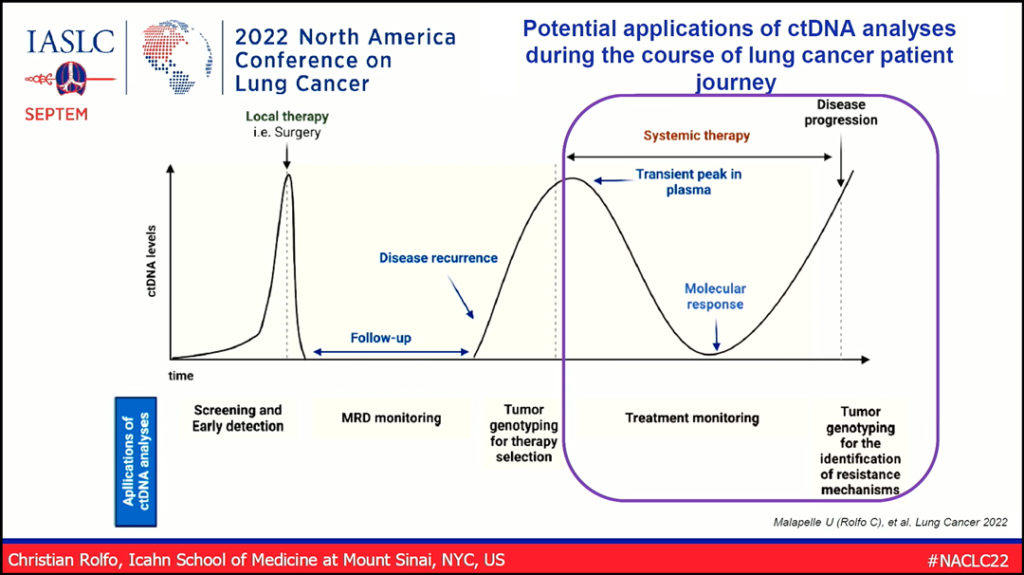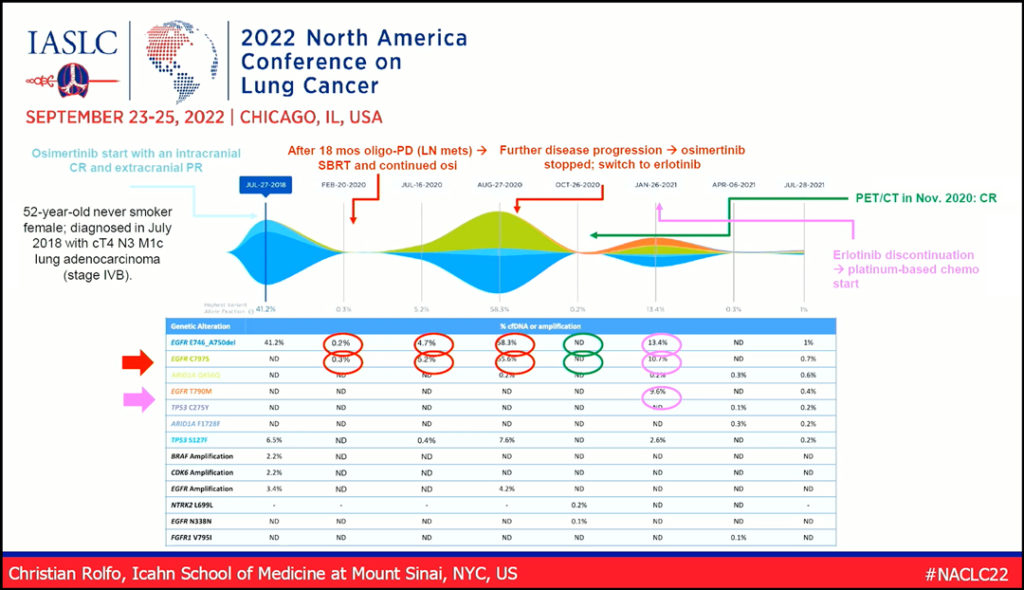
Circulating tumor DNA has proven to be useful for detecting and diagnosing tumors and guiding tumor-specific treatments. However, thoracic oncologists—and thus their patients—may be able to derive more benefit from this tool than they realize.
During the IASLC’s 2022 North America Conference on Lung Cancer, presenter Christian Rolfo, MD, PhD, MBA, of Icahn School of Medicine, Mount Sinai, New York, outlined the potential applications of ctDNA analyses throughout the course of the lung cancer treatment journey (Fig. 1).
With his lecture, titled “Role of Liquid Biopsy in Monitoring Progression,” Dr. Rolfo demonstrated why he believes ctDNA to be a perfect tool for monitoring patients—one that is applicable from metastatic disease to minimal residual disease (MRD).

“We start our liquid biopsy journey in the metastatic setting, creating a lot of robust data that we are using in clinical practice,” said Dr. Rolfo, who is associate director of clinical research at the Center for Thoracic Oncology at Mount Sinai’s Tisch Cancer Institute.
“One of the advantages of liquid biopsy is its ability to capture heterogeneity and clonal evolution, and that is one of the reasons we’re interested in it for monitoring,” he said.
Acquired resistance is a dynamic process. The mechanisms of acquired resistance might be heterogenous and multiple mechanisms can simultaneously occur in the same patient, reflecting the clonal heterogeneity of the tumor, Dr. Rolfo said.
“Tracking the clonal evolution of the tumor over time might allow the implementation of tailored therapeutic approaches,” he said. “Liquid biopsy can capture this dynamic evolution of resistance mechanisms to targeted therapies.”
To illustrate this, Dr. Rolfo shared case data from his first attempt to use ctDNA to monitor a patient’s disease progression (Fig. 2). He discussed how he used the liquid biopsy data, which he began collecting in July of 2018, to monitor and tailor the treatment in this case.

Dr. Rolfo went on to look at the potential clinical applications of ctDNA specifically in patients receiving immune checkpoint inhibition.
In discussing the dynamics of tumor and immune responses during immune checkpoint blockade in non-small cell lung cancer (NSCLC), Dr. Rolfo reviewed a study from Anagnostou et al,1 which was one of the first to demonstrate that liquid biopsy can predict overall survival and progression-free survival in patients who have a clearance of ctDNA.
“ctDNA clearance may be a good tool to help determine when to add treatments or not,” he said. “Liquid biopsy may also be a helpful tool to determine if it’s time to stop a treatment. More study is needed, but I think it’s an important clinical question.
In addition, multiple studies of patients with NSCLC treated with immune checkpoint inhibitors have shown that changes in ctDNA reflect clinical benefit. ctDNA may also serve as an important tool in clinical development and an early indicator of treatment benefit, Dr. Rolfo said.
Finally, Dr. Rolfo discussed how ctDNA dynamics can predict benefit from consolidation immunotherapy in locally advanced NSCLC.
Looking at retrospective analysis from Moding EJ, et al.2 using liquid biopsy in patients after chemoradiotherapy (CRT), detection of ctDNA before immunotherapy consolidation was a strong predictor of risk of progression, he said. Detectable ctDNA after starting consolidation immunotherapy was highly prognostic.
“So, patients with undetectable ctDNA after CRT may not benefit from consolidation immunotherapy,” Dr. Rolfo said. “Then we can look at IMpower010, which used liquid biopsy as well, but I want you to pay attention to the timing. This is extremely important. It was only after surgery.
“We don’t have data from before surgery to see which kind of patients had a high ctDNA before surgery. Still, ctDNA positivity was strongly prognostic, with disease-free survival favoring atezolizumab in both ctDNA+ and ctDNA- patients. So, this has opened a door. How will we manage these patients in the future?”
References
- 1. Anagnostou V, Forde PM, White JR, et al. Dynamics of Tumor and Immune Responses during Immune Checkpoint Blockade in Non-Small Cell Lung Cancer. Cancer Res. 2019;79(6):1214-1225. doi:10.1158/0008-5472.CAN-18-1127
- 2. Moding EJ, Liu Y, Nabet BY, et al. Circulating Tumor DNA Dynamics Predict Benefit from Consolidation Immunotherapy in Locally Advanced Non-Small Cell Lung Cancer. Nat Cancer. 2020;1(2):176-183. doi:10.1038/s43018-019-0011-0





